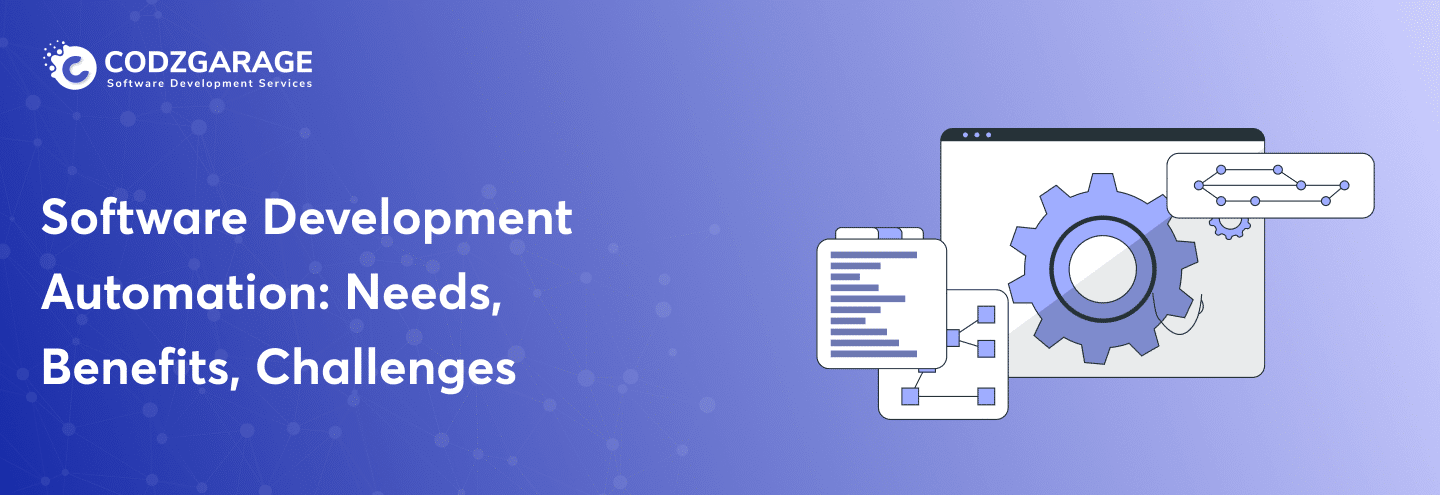5 High-End Software Development Methodologies: Which Should be The Right One for Your Project?
Are you one of those who are on the verge of embarking on software development but find themselves all at sea when choosing a software development methodology? If yes, no worries! You’re where you should be. This article will let you know which one of the software development approaches to choose for your project.
As digitization picks up pace, businesses nowadays continue to focus more on creating robust, scalable, and feature-rich software solutions that can address their business challenges along with that of their clients. But building software that’s that good requires the right approach to software development.
A well-organized infrastructure, team, and tech stack, indeed, come in handy; however, to build high-performance software, you need something beyond that, and that’s a software development methodology. In this article, we’re going to assess the top 5 software development methodologies to give you a clear view of which one should be the right one for you.
Before moving up any further, first off, we should have a brief glance at the software development methodology. So, let’s do it!
What’s a Software Development Methodology?
A software development methodology is a well-defined process for software development. It allows developers to create software by following a predefined pathway that helps them remain on track while keeping them from wandering in between the project development. This helps the team working on software development projects focus more on the end goal— as it shows them the step-by-step process needed to perform.
Apart from that, software development methodologies create a kind of norm for development teams, capacitating them to know the way to work and share information, including discussion, documentation, or drawing on a piece of paper.
Statistics Related to Software Development Methodology
Did you know? IT spent $783 billion on enterprise software development in the year 2022, says Statista. It’s a 7.1% growth compared to the previous year. Similar to all the sub-segments of the IT industry, the enterprise software development market has experienced proliferative growth during recent years and is anticipated to grow in the years ahead.

Top 5 Software Development Methodologies
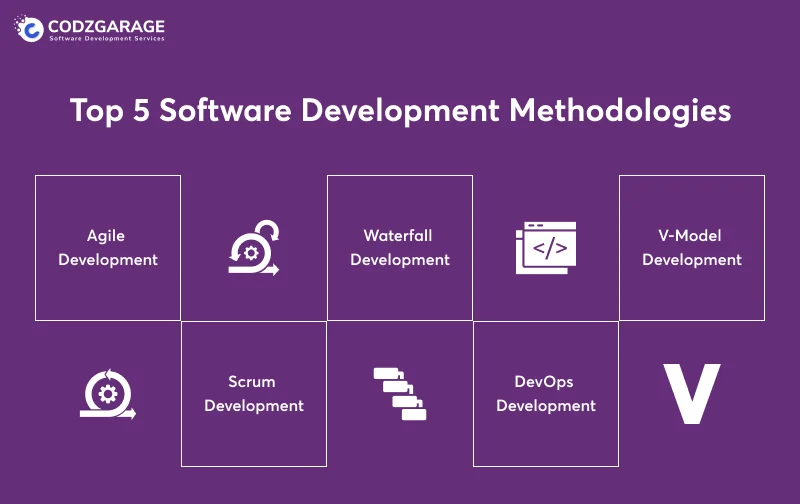
When it comes to software development methodology, it’s different. Yes, you’ve heard that right. There are a multitude of software development methodologies that differ from one another and have their specific pros and cons. No two development approaches are likely to have a similar influence on a project but go differently. Therefore, here’s a complete list of some software development approaches with extensive analysis that’ll help you choose the right methodology that fits your project.
Agile Software Development Methodology
Agile is one of the best examples of software development methodologies that are used to design disciplined management for the software development process. The methodology not only helps you manage the software development process better but also allows the possibility for rapid changes to that. Agile methodology for software development is a single conceptual framework to undertake multiple software development processes. It’s used to mitigate software development risks by creating them in a short time frame; that’s called iteration. It, in general, lasts anywhere from a week to a month.
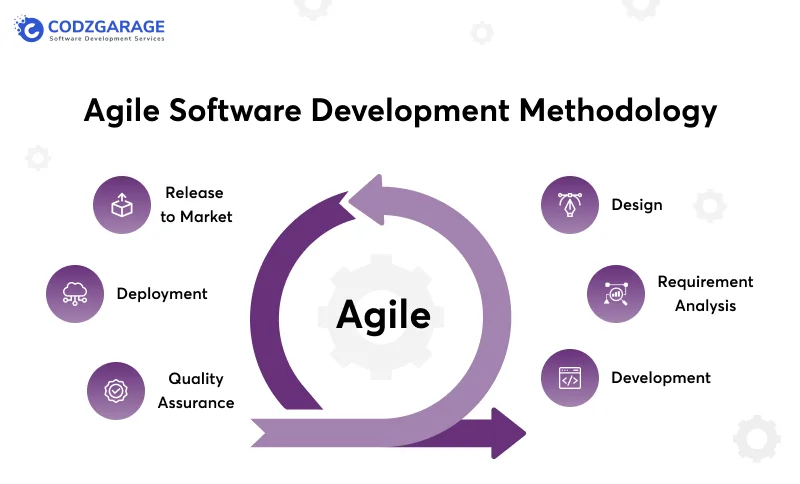
Pros of Agile Methodology
Agility comes good things, helping you make continuous improvements. You know all the good things that agile development brings to the table. We have segregated them in two parts to bring you more clarity. For example, we will discuss the advantages of agile methodology, followed by the disadvantages. Let’s explore the advantages first.
- Rapid software development results in faster delivery.
- Follows the “keep it simple” approach to adjusting the process constantly.
- Teams can keep track of the development process uninterruptedly after delivering each increment.
- Enhanced productivity, business value, customer satisfaction, and so on.
- The team members have face-to-face interaction to make sure the process goes on smoothly.
Cons of Agile Methodology
Everything comes with good and bad sides. So, we have discussed the pro part of Agile development methodology. Now, let’s discuss the downside of it. The aim of this downside is to help you understand everything in detail, it’s not an intimidation as the disadvantages it carries can be eliminated. Let’s explore the few cons it has;
- No appropriate plan creates confusion for developers when moving through different stages of the project.
- Converts comprehensively into limited user stories that make it tiresome for developers to get exact customer’s requirements.
- Maintaining collaboration is a kind of big deal.
Scrum Software Development Methodology
Scrum makes use of an iterative software development approach in which the members of the team break down large tasks into multiple small ones and work on them by following sprints. It’s an incremental process that allows streamlined development, even for complex projects. Furthermore, Scrum enables developers to incorporate conventional software development approaches with scalable Agile practices.
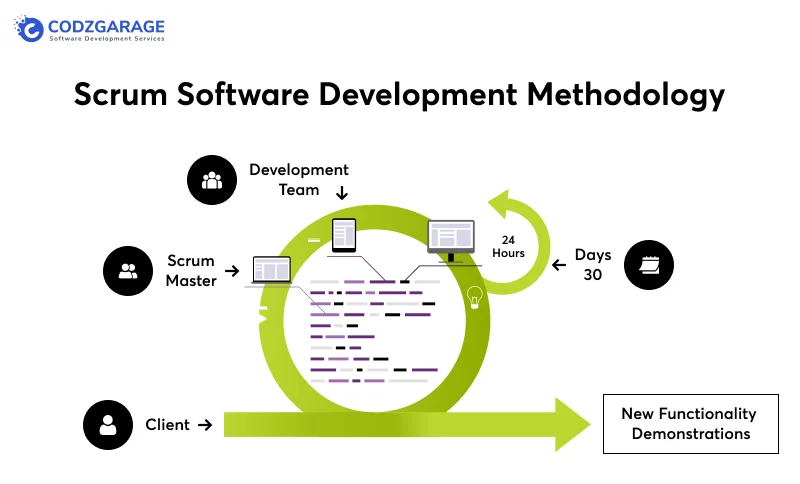
Pros of Scrum Methodology
Like agile, scrum is no different. It has both —the pro side and the downside. So, we have simplified this by explaining both separately. First, we shall discuss the pro part of scrum methodology and then will explore the cons.
- Assists you in mitigating unexpected expenses of time and cost.
- Ensures operations in the best possible ways.
- Allows testing of the software product before deployment to find potential flaws.
- Feasibility of changes with reduced time and effort, along with the addition of them to the next sprints.
- Clear and concise sprint meeting agendas.
Cons of Scrum Methodology
The cons scrum methodology is not as stiff as hiring the right developer or development team; the cons can be eliminated. It comes with a few downsides. For example, you need to train your team at an extensive level, while scaling can be a challenge. You may also need to bring significant transformation within your organization.
- Scrum requires proper training and isn’t that easy to scale up.
- Increased chances of failure when individuals fail to cooperate in the way they should.
- UNK The lack of a fixed end date creates scope creep.
- Adoption is way more challenging and can be useful only when there’s an experienced team.
- Crucial transformation is needed within the organization.
Waterfall Software Development Methodology
The next one we have is the Waterfall Methodology, which is one of the well-known software development methodologies used by developers worldwide. It clarifies the software development procedure following a linear sequential flow. You should cross-check the earlier phase for completion in each development phase of the development life cycle. The waterfall is considered a classic style of software created by the majority of businesses.
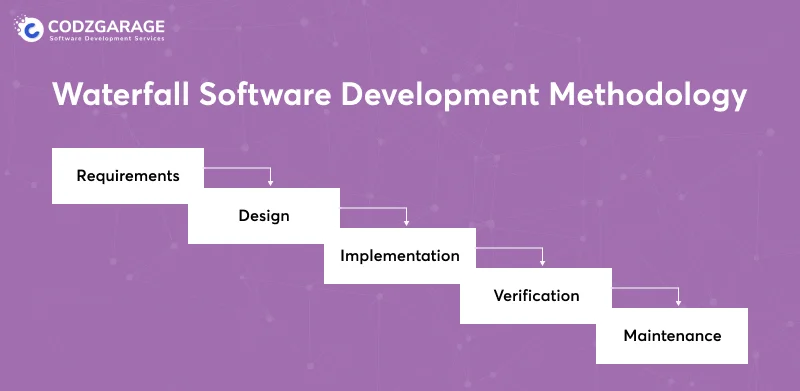
Pros of Waterfall Methodology
Pros of Waterfall Methodology Waterfall methodology is known for offering a clear structure to help the team working on the project stay collaborative. From smooth transfer of information, easy to management, and goal determination to stable and well-defined deliverables, this methodology offers some good perks to your development team.
- The waterfall methodology is properly structured and convenient to implement.
- A strict reporting system allows complete access to the admin.
- Developers are capable of determining software release dates in no time.
- Well-defined project goals and deadlines.
- Developers can make changes in advance.
Cons of Waterfall Methodology
One of the major disadvantages of waterfall methodology is the end users and clients never prioritized. That means neither clients nor end users can send feedback. No doubt, such issues are not so harmful to projects as the team can use another method to stay connected with users and clients.
- It isn’t suitable for complex and high-risk projects.
- Fails to support overlapping of processes.
- There’s no possibility for error correction.
- It isn’t capable of accumulating risks.
- Even when you need a single change, it can interrupt the entire process.
DevOps Software Development Methodology
DevOps is another popular software development approach gaining traction because of the benefits it offers to users. The separate procedure for development and operation is no longer as it was at the inception of DevOps. The two departments (development and operation) now function hand in hand as a single process throughout the life cycle. The continuous integration and delivery model enables the development as well as operation teams to conduct everything like software development, testing, and the like synchronously.
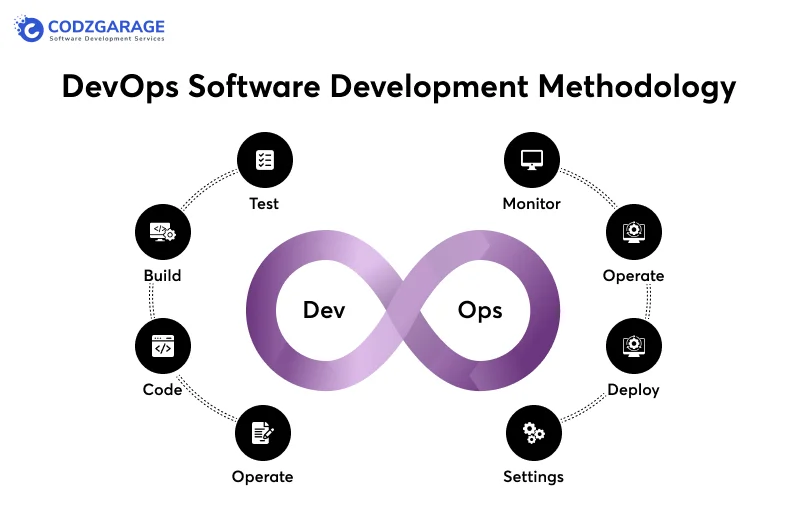
Pros of DevOps Methodology
Faster, better, and smoother product delivery is unimaginable without following DevOps methodology. DevOps are used for quality outputs and they are best suited for scalability and availability. Let’s explore the benefits of using DevOps.
- Automation of repetitive tasks for streamlined innovation.
- Increased visibility into system outputs.
- An excellent work environment and improved product quality
- Appropriate utilization of tools and resources.
- Faster issue resolution.
- Automated development process.
- Automated testing.
Cons of DevOps Methodology
There can be various cons of DevOps methodology, though the two can impact experience. For example, team maturity and competence. Let’s take a look at the downside we have listed here.
- Getting a wide range of DevOps professionals is full of hassle.
- Increased cost and complexity.
- It’s tiresome to transition to DevOps.
- The definition is full of ambiguity.
V Model Software Development Methodology
One of the other types of system development methodology is the V Model. It’s one of the well-known software models utilized to create custom software. Using this, developers have the competencies to add functionalities for testing at each project development stage, leading to the reduced time of the accomplishment of the project. Since you can’t move to another phase without completing the previous one, there’s no chance for you to deviate from embracing your project’s goal.
Pros of V Model
The V model is also known as the verification and validation model. This model is good for complex projects that require rigorous testing. It does it by guiding the team to identify the right phase where the testing needs to be performed in SDLC. Apart from that, it does a lot of things that are necessary for projects before the developers finish writing code.
- Early detection of bugs.
- Simplified and easy-to-use methods.
- Keeping track of progress is convenient.
- Bug fixing can be done in the initial stages.
- Higher success rate compared to the Waterfall model.
- The validation process to ensure an enterprise-grade software product.
Pros of V Model
The V model is also known as the verification and validation model. This model is good for complex projects that require rigorous testing. It does it by guiding the team to identify the right phase where the testing needs to be performed in SDLC. Apart from that, it does a lot of things that are necessary for projects before the developers finish writing code.
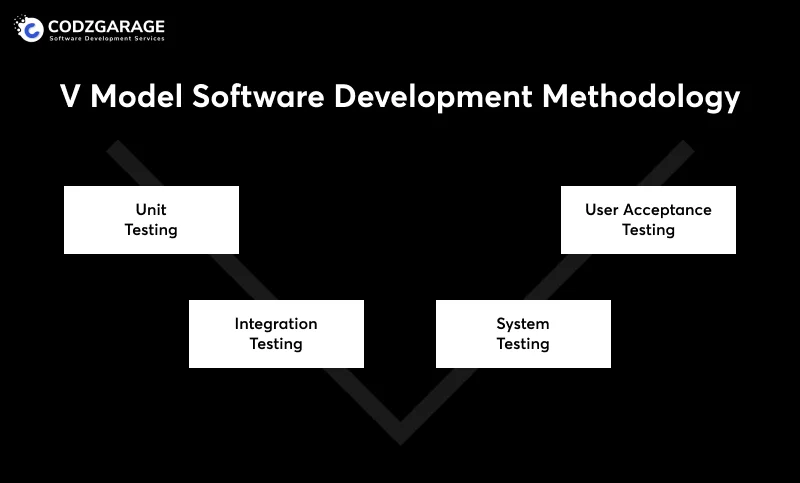
- Early detection of bugs.
- Simplified and easy-to-use methods.
- Keeping track of progress is convenient.
- Bug fixing can be done in the initial stages.
- Higher success rate compared to the Waterfall model.
- The validation process to ensure an enterprise-grade software product.
Cons of V Model
The V model comes with a few downsides. On one hand, it is crucial for SDLC as it helps the team test projects at every stage of the development life cycle, it offers limited flexibility and adaptability, on the other hand. It can be costly if you have a tight budget as this model takes a of time for execution. Here are some of the top disadvantages we have mentioned. Let’s explore.
- Complex documentation and planning.
- Extremely risky and uncertain.
- Lacking clarity about project goals.
- No support for the iteration of phases.
- Not a suitable choice for complex projects.
- Not competent in handling concurrent events.
Signing Off…!
That’s pretty much about it! Here, you have all 5 top-notch software development methodologies using which you can create high-end software solutions for your organization. Each of the software development methodologies suggested in this article is preferred by developers and organizations across the world for yielding ground-breaking software solutions.
Although each of the above-mentioned software development methodologies is an excellent choice, they may have different influences based on the project. So, you better assess them for your use cases to make sure you end up building software that works well and helps you embrace your end goals.
Want
to Hire a Dedicated Team for Your .NET Project?Our Expertise
- Dedicated resources
- Skilled expertise
- Deadline commitment







 Kevin Bhut
Kevin Bhut 


